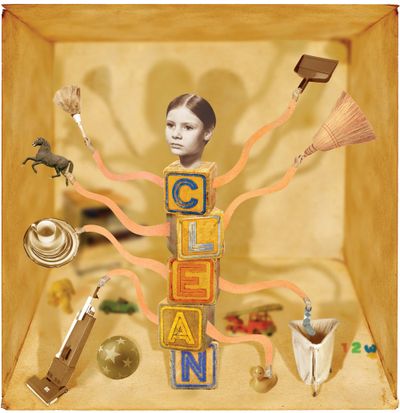Having children help with chores builds grit

Eighty-two percent of American adults regularly did chores as children, including cleaning, cooking, laundry and dishes. Just 28 percent ask the same of their own kids.
A national survey of 1,001 respondents in mid-September found that we are loath to ask our kids to pull their weight around the house. Or maybe we just loathe asking over and over. And over.
When the parents who do assign chores were asked how their children feel about their duties, 43 percent said they complain, and 37 percent said they try to get out of them. Thirteen percent said their kids will only do chores if they get paid.
But 75 percent of respondents said they believe regular chores make children “more responsible,” and 63 percent said chores teach kids “important life lessons.” A mere 5 percent said they could think of “no benefits” to giving kids some household duties.
“Chores have a lot of short-term and long-term developmental benefits in terms of academic and social success,” says Richard Rende, a developmental psychologist and researcher from Brown University who worked on the study commissioned by Whirlpool. “What we’re trying to hone in on is why families have moved away from kids doing chores and how we can help families reframe chores as a way to take care of each other.”
Maybe we need to remind ourselves, as often as we do our kids, that chores are good for them.
“Chores build grit,” Rebecca Jackson, co-author of “The Learning Habit: A Groundbreaking Approach to Homework and Parenting That Helps Our Children Succeed in School and Life” (Perigree Trade), told me recently. “Few things will serve your kids as well as grit.”
I keep that in mind when I ask my own kids to take on the simplest of chores – setting the table, clearing the table, emptying the hamper into a laundry basket. I keep it in mind when they whine and stall and perform the tasks in hilariously poor fashion.
And I keep it in mind when I consider tossing in the towel and leaving chores to the adults. Maybe the school cafeteria will build grit. Oh! Public transportation! That’s gritty!
But we plod through.
“One of the reasons chores have such a positive effect is not just the idea of kids learning responsibility, per se, but a broader perspective that kids are learning they have a role in the family,” Rende says. “It contributes to family cohesion when there’s a feeling of everybody trying to help each other and take care of each other. There’s even research that it promotes empathy; that was a real aha moment for me.”
I’d like to say we’ve found a way to make chores fun. Or that I sense my kids taking joy in contributing to the greater good. Or that they occasionally perform their extremely minimal responsibilities without being nagged.
I can’t say any of that. I can say that my son happily empties that hamper if I turn the laundry basket into a target and let him fling the dirty clothes at it from various poses and distances. That doesn’t feel like building grit, though. And it takes four times as long.
But I think it’s still valuable.
“Reinforcing to kids the idea that they are effective and can think of themselves as helpful really establishes those thoughts of, ‘I have a stake in this. I can be effective. I can do good and it feels good,’ ” Rende says. “That kind of social motivation is an important reminder to focus not so much on how much a child is helping, but whether the child is being a helper.”